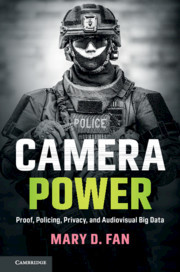Description
Camera Power
Proof, Policing, Privacy, and Audiovisual Big Data
Author: Fan Mary D.
This is the first book on the policy questions raised by two revolutions in recording the police - copwatching and police-worn body cameras.
Language: English
Subject for Camera Power:
Approximative price 107.81 €
In Print (Delivery period: 14 days).
Add to cart
Police Power and the Video Revolution
Publication date: 05-2019
274 p. · 15.6x23.5 cm · Hardback
Publication date: 05-2019
274 p. · 15.6x23.5 cm · Hardback
Police Power and the Video Revolution
Publication date: 05-2019
274 p. · 15.3x22.8 cm · Paperback
Publication date: 05-2019
274 p. · 15.3x22.8 cm · Paperback
Description
/li>Contents
/li>Biography
/li>
Camera Power is the first book to tackle the policy questions raised by two ongoing revolutions in recording the police: copwatching and police-worn body cameras. Drawing on original research from over 200 jurisdictions and more than 100 interviews - with police leaders and officers, copwatchers, community members, civil rights and civil liberties experts, industry leaders, and technologists - Mary D. Fan offers a vision of the great potential and perils of the growing deluge of audiovisual big data. In contrast to the customary portrayal of big data mining as a threat to civil liberties, Camera Power describes how audiovisual big data analytics can better protect civil rights and liberties and prevent violence in police encounters. With compelling stories and coverage of the most important debates over privacy, public disclosure, proof, and police regulation, this book should be read by anyone interested in how technology is reshaping the relationship with our police.
Introduction: dual revolutions in recording the police; Part I. Toutveillance Power and Police Control: 1. Policing in the camera cultural revolution; 2. Copwatching and the right to record; 3. Democratizing proof, taking the case to the people; Part II. Audiovisual Big Data's Great Potential and Perils: 4. Audiovisual big data analytics and harm prevention; 5. Partisan perceptions: how audiovisual evidence and big data can mislead; 6. Privacy and public disclosure; Part III. Frameworks for Moving Forward: 7. Controlled access, privacy protection planning, and data retention; 8. Non-recording and officer monitoring and discipline dilemmas; Conclusion. Beyond technological silver bullets.
Mary D. Fan is the Henry M. Jackson Professor of Law at the University of Washington. She is a former federal prosecutor and she served as an associate legal officer at a UN tribunal. Professor Fan was elected to the American Law Institute (ALI) in 2012 and is an Advisor to the ALI's Model Penal Code: Sexual Assault and Related Crimes Project.
© 2024 LAVOISIER S.A.S.




